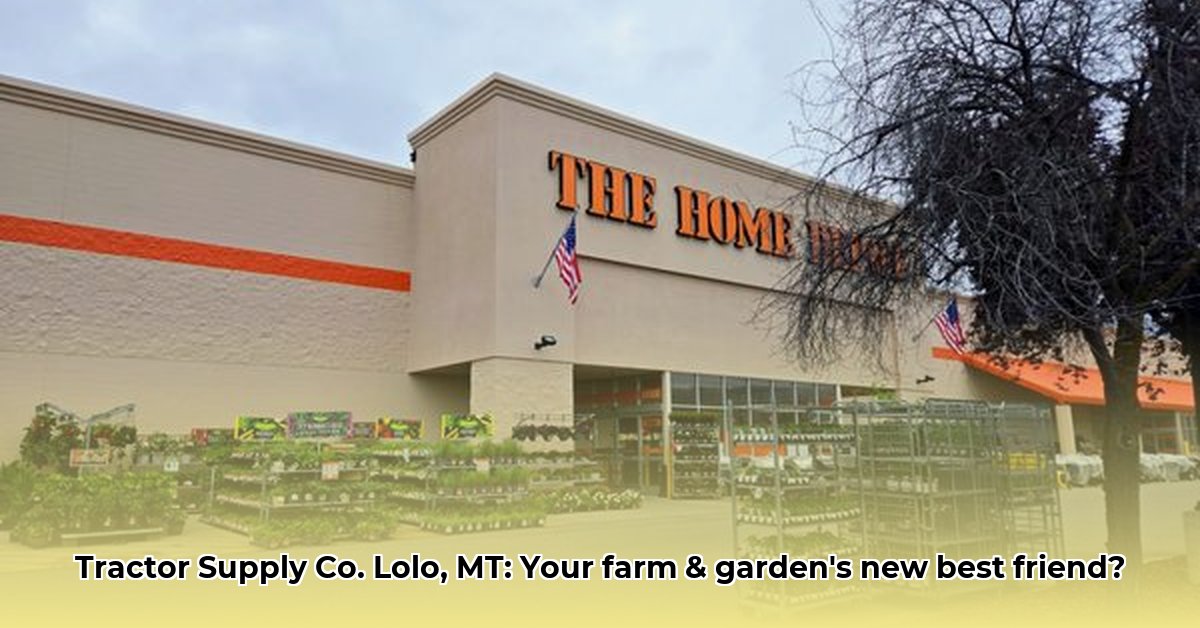
Tractor Supply Company (TSC) in Lolo, Montana, plays a significant, albeit indirect, role in shaping sustainable agricultural practices within the local community. This article analyzes TSC's contribution, highlighting both its direct influence through product availability and its indirect impact on farmer and gardener choices. We will explore opportunities for improvement and propose actionable steps for TSC, local farmers, the government, and consumers to foster a more sustainable agricultural future in Lolo. For examples of similar initiatives, see this case study.
TSC's Lolo, MT Inventory: A Gateway to Sustainable Resources
TSC's Lolo location serves as a vital resource for local farmers and gardeners, offering a wide array of products crucial for agricultural operations. The store stocks items directly supporting sustainable practices, including organic seeds, diverse livestock feed options, efficient watering systems, durable fencing materials, and essential tools. This readily available selection significantly benefits the community, simplifying access to resources that empower sustainable farming and gardening choices. Isn't this ease of access a critical factor in encouraging sustainable agriculture? The sheer convenience of finding these necessities in one location significantly reduces barriers to entry for those seeking eco-friendly alternatives.
The Indirect Influence: Empowering Sustainable Choices
While TSC doesn't explicitly promote sustainable farming techniques, its product offerings exert a significant indirect influence. The availability of organic seeds and environmentally conscious feed options, for example, directly empowers farmers and gardeners to incorporate sustainable practices into their operations. The presence of these products increases the likelihood of their adoption, creating a ripple effect within the community. However, quantifying this precise impact remains challenging; the store provides the tools, but the ultimate implementation of sustainable practices rests with individual choices. Yet, some experts posit that readily available sustainable options significantly increase adoption rates.
TSC's Sustainability Efforts: An Untapped Potential
Currently, TSC's public communications lack detailed information on specific sustainability initiatives. This absence doesn't necessarily indicate a lack of effort, but it highlights an opportunity for increased transparency and proactive engagement. Imagine the impact if TSC prominently promoted its eco-friendly product lines and partnered with local agricultural organizations to offer workshops on sustainable farming within the store or online. This proactive approach could significantly amplify TSC’s positive impact. The potential for leadership in sustainable practices within the region remains largely unfulfilled.
Actionable Steps Towards a Greener Future
Achieving a more sustainable agricultural landscape in Lolo demands a collaborative effort. Success depends on active participation from all stakeholders, including TSC, local farmers, the government, and consumers.
1. For Tractor Supply Company:
- Conduct a thorough sustainability audit across its entire supply chain, identifying areas for improvement in sourcing, packaging, and transportation.
- Develop a transparent sustainability plan with specific, measurable goals and timelines, publicly communicating progress.
- Partner with local agricultural experts and organizations to host workshops and educational resources promoting sustainable farming methods.
- Expand its inventory to include a wider variety of organic and sustainably sourced products.
2. For Local Farmers and Gardeners:
- Prioritize purchasing sustainable products from TSC and other local retailers.
- Offer feedback to TSC regarding desired sustainable products and services.
3. For the Local Government:
- Collaborate with TSC to develop and implement initiatives supporting sustainable agricultural practices, including joint educational campaigns and financial incentives.
- Offer financial or other support to encourage the adoption of sustainable farming techniques.
4. For Consumers:
- Make conscious purchasing decisions, seeking out sustainable and ethically sourced products.
- Support businesses demonstrating a strong commitment to environmental responsibility.
Navigating Risks and Regulatory Compliance
TSC, like any business, faces potential risks. Its reliance on fossil fuels for transportation, potential packaging waste, and the indirect influence on unsustainable practices (if sustainability is not actively promoted) all require careful consideration. Transitioning to renewable energy sources in logistics and investing in biodegradable packaging can mitigate environmental impact. Strict adherence to environmental, animal welfare, and labor regulations is paramount. Continuous exploration of more sustainable agricultural practices is crucial for minimizing future risks.
Conclusion: Building a Sustainable Future Together
The future of sustainable agriculture in Lolo hinges on collaboration and proactive change. While TSC's role is primarily indirect, its influence remains substantial. By embracing a more proactive approach to sustainability – expanding its eco-friendly product offerings, promoting sustainable practices, and partnering with the local community – Tractor Supply Company can significantly contribute to a healthier environment and a thriving local economy. This is not merely about TSC; it's about a shared journey toward a more sustainable future for all.